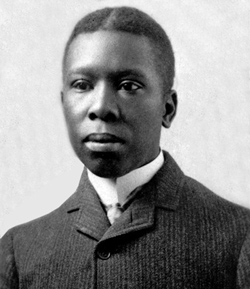

Wife Alice Dunbar Nelson
Queer Places:
219 N Paul Laurence Dunbar St, Dayton, OH 45402
Woodland Cemetery and Arboretum
Dayton, Montgomery County, Ohio, US
 Paul Laurence Dunbar (June 27, 1872 – February 9, 1906) was an
American poet, novelist, and playwright of the late 19th and early 20th
centuries. Born in
Dayton, Ohio, to parents who had been
enslaved in
Kentucky
before the
American Civil War, Dunbar began to write stories and verse when still a
child; he was president of his high school's literary society. He published
his first poems at the age of 16 in a Dayton newspaper.
Paul Laurence Dunbar (June 27, 1872 – February 9, 1906) was an
American poet, novelist, and playwright of the late 19th and early 20th
centuries. Born in
Dayton, Ohio, to parents who had been
enslaved in
Kentucky
before the
American Civil War, Dunbar began to write stories and verse when still a
child; he was president of his high school's literary society. He published
his first poems at the age of 16 in a Dayton newspaper.
Much of Dunbar's more popular work in his lifetime was written in the "Negro dialect" associated with the antebellum South, though he also used the Midwestern regional dialect of James Whitcomb Riley.[1] Dunbar's work was praised by William Dean Howells, a leading editor associated with the Harper's Weekly, and Dunbar was one of the first African-American writers to establish an international reputation. He wrote the lyrics for the musical comedy In Dahomey (1903), the first all-African-American musical produced on Broadway in New York. The musical later toured in the United States and the United Kingdom.
After returning from the United Kingdom, Dunbar married Alice Ruth Moore, on March 6, 1898. She was a teacher and poet from New Orleans whom he had met three years earlier.[21] Dunbar called her "the sweetest, smartest little girl I ever saw".[22] A graduate of Straight University (now Dillard University), a historically black college, Moore is best known for her short story collection, Violets. She and her husband also wrote books of poetry as companion pieces. An account of their love, life and marriage was portrayed in Oak and Ivy, a 2001 play by Kathleen McGhee-Anderson.[23]
In October 1897 Dunbar took a job at the Library of Congress in Washington, DC. He and his wife moved to the capital, where they lived in the comfortable LeDroit Park neighborhood. At the urging of his wife, Dunbar soon left the job to focus on his writing, which he promoted through public readings. While in Washington, DC, Dunbar attended Howard University after the publication of Lyrics of Lowly Life.[24]
In 1900, he was diagnosed with tuberculosis (TB), then often fatal, and his doctors recommended drinking whisky to alleviate his symptoms. On the advice of his doctors, he moved to Colorado with his wife, as the cold, dry mountain air was considered favorable for TB patients. Dunbar and his wife separated in 1902, but they never divorced. Depression and declining health drove him to a dependence on alcohol, which further damaged his health.
Dunbar returned to Dayton in 1904 to be with his mother. He died of tuberculosis on February 9, 1906, at the age of 33.[25] He was interred in the Woodland Cemetery in Dayton.[26]
My published books:
https://en.wikipedia.org/wiki/Paul_Laurence_Dunbar